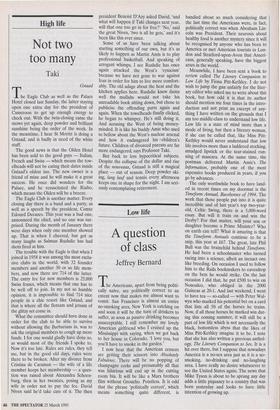Low life
A question of class
Jeffrey Bernard The Americans, apart from being politi- cally naïve, are politically correct to an extent now that makes me almost want to vomit. San Francisco is almost an entire no-smoking area, New York is catching on and soon it will be the turn of drinkers to suffer, as soon as passive drinking becomes unacceptable. I still remember my lovely American girlfriend who I cruised up the Mississippi with saying, when we got back to her house in Colorado, 'I love you, but you'll have to smoke in the garden.'
I now hear that the American censors are getting their scissors into Absolutely Fabulous. There will be no popping of champagne corks and presumably all that was hilarious will end up in the cutting room bin. It will be like a Marx brothers film without Groucho. Pointless. It is odd that the phrase 'politically correct', which means something quite different, is bandied about so much considering that the last time the Americans were, in fact, politically correct was when Abraham Lin- coln was President. Their neurosis about healthy food is another mystery since it will be recognised by anyone who has been to America or met American tourists in Lon- don and Stratford-upon-Avon that Ameri- cans, generally speaking, have the biggest arses in the world.
Meanwhile, I have been sent a book to review called The Literary Companion to Low Life by Fiona Pitt-Kethley. I do not wish to jump the gun unfairly for the liter- ary editor who asked me to write about this book, but how odd it is that its author should mention me four times in the intro- duction and not print an excerpt of any- thing I have written on the grounds that I am too middle-class to understand low life. Low life is a state of mind more than a mode of living, but then a literary woman, if she can be called that, like Miss Pitt- Kethley would never understand that low life involves more than a laddered stocking, smudged lipstick or the tear-stained run- ning of mascara. At the same time, the postman delivered Martin Amis's The Information, probably one of the most expensive books produced in years, if you go by advances.
The only worthwhile book to have land- ed in recent times on my doormat is the Timefonn Annual, Racehorses of 1994. The work that those people put into it is quite incredible and of last year's top two-year- old, Celtic Swing, there is a 5,000-word essay. But will it train on and win the Derby? For that matter, will your son or daughter become a Prime Minister? Who on earth can tell? What is amazing is that the Timeform Annuals continue to be a snip, this year at £67. The great, late Phil Bull was the brainchild behind Timefonn. He had been a schoolmaster who turned racing into a science, albeit an inexact one like breeding. On occasion I used to follow him to the Rails bookmakers to eavesdrop on the bets he would strike. On the last occasion I did that, he put £500 to win on Nonoalco, who obliged in the 2000 Guineas at 20-1. And last weekend, I went to have tea — so-called — with Peter Wal- wyn who marked his potential bet on a card that lists all 50 of the horses he trains. Now, if all those horses he marked win dur- ing this coming summer, it will still be a part of low life which is not necessarily the black, bottomless abyss that the likes of Miss Pitt-Kethley imagine it to be. I note that she has also written a previous anthol- ogy, The Literary Companion to Sex. It is a hit over there, but I suppose that nowadays America is a no-sex area just as it is a no- smoking, no-drinking and no-laughing area. I have really no desire whatsoever to see the United States again. The news that Mike Tyson is about to be sprung any day adds a little piquancy to a country that was born yesterday and looks to have little intention of growing up.


























































 Previous page
Previous page